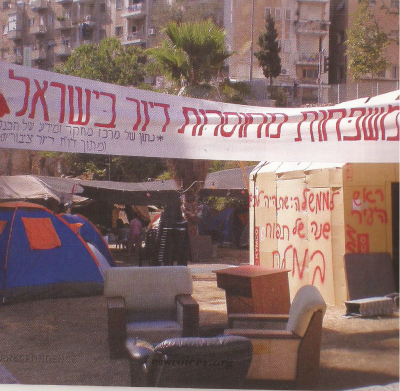On the corner of Jerusalem’s King George and Ben Yehuda Streets is a small, stone-paved park with a large, steel sculpture of a horse at its entrance. This outdoor plaza, known affectionately as Horse Park, sits at the epicenter of Jerusalem’s cultural fault lines: its bustling commercial districts, its quiet religious neighborhoods, its best restaurants, and some of its largest and oldest synagogues.
For over three months this fall, Horse Park was under a sort of occupation. Two rows of camping tents and a makeshift kitchen full of dust and grease surrounded a de facto central courtyard. On the September day I visited, a large, white banner at the end of the campsite closest to King George Street read in stark Hebrew: “53,000 Families Are Homeless in Israel.” Other banners were hung from nearby trees and lampposts: “We Want Justice Not Charity” and “Olmert: You Have Five Houses. Where Are Ours?” At the center of the park, Israelis chattered happily on cell phones; barefoot children read, laughed with older siblings and ran about the park as if at home; two young guitarists and a cellist played lively music while smokers pulled at one cigarette after another.
I approached a girl of six or seven, seeking someone to guide me through the small settlement’s hustle and bustle. She pointed me towards a woman named Ayela, who I found lying on a dirty mattress, smoking and relaxing under a late-summer sun.
She smiled up at me and invited me to sit next to her. “Everyone living here right now is homeless,” she began. “We’ve set up a protest here, against the government because the government isn’t providing enough housing, enough jobs, enough of anything for anyone living at the poverty line here in Israel.”
This group of homeless families, in protest of the injustice of their beleaguered status, set up their settlement in the middle of Jerusalem in order to publicly demonstrate their discontent. The campsite was a sit-in, or more accurately, a live-in. Government housing is available in Israel, but applicants often must wait years for a space. The problem affects Israelis on all levels, but is hardest on single mothers, on large families, and on people who don’t receive pensions or weren’t in the Israeli Defense Force. It is particularly acute in the immigrant communities, among whom many of these factors frequently coincide.
Ayela and her family were brought to Israel during the mass immigration of Jews of Mizrahi descent, the historic group flights that brought millions of Diaspora Jews from Iraq, Iran, Morocco, Egypt, and Yemen to Israel. Their arrival coincided with the final stages of Israel’s experiment in maintaining a functionally socialist economy. Today, the relatively recent shift to a capitalist, free-market economy has created exacerbated wealth disparities across ethnic groups. Former Prime Minister Benjamin Netanyahu’s economic reforms, which cut back on social welfare projects and government pay to the poor, coupled with Prime Minister Ehud Olmert’s technocratic emphasis on capital development, have brought what was thought impossible only one generation ago: Israel’s systematic marginalization of the poor.
“This is our truth,” Ayela said, pointing to the tents surrounding us. “We have no power, no voice, no opportunities, no security. Nothing.” She paused and called her two young daughters to introduce themselves. “My daughters return from school at 2:30 every afternoon and have no one to look after them. They come back here – to what? Why should they live in this? We know that there is enough money, that they could build housing for us, provide better facilities. They brought our families here – they can’t abandon us forever.
“We’re nomads now, like Bedouins,” she continues. “We’ve been here for 100 days and we’ll stay until we’re removed. Who knows what will happen in another hundred days, but we have to remain strong. There is nothing else to do,” she said, passing me a handful of flyers advertising an upcoming event at the settlement. “Dispersed, hurt, weakened, neglected, abandoned by the government of Israel!” the flyer read. “We will ‘celebrate’ the New Year under pretty skies in a campsite. Citizens, I invite you to support us in this sad holiday and to come to our celebration before Rosh Hashanah.” Ayela’s name was at the bottom of the flyer, along with her cell phone number. That indefatigable Israeli camaraderie flashed on her face as she wished me a healthy new year.
…
Three weeks later, I am downtown again, having returned to Jerusalem from a trip abroad. I stop at Horse Park expecting to see the protesters’ campsite and a handful of new signs. No one is there: the tents have been packed away, the signs have been taken down, and all that remains is a somewhat battered patch of grass and a stretch of concrete. I ask security guards and shopkeepers who work daily in the area, but no one knows where the protesters have gone. “Home?” one suggests.
Israel coverage is made possible by Targum Shlishi, a Raquel and Aryeh Rubin Foundation.

